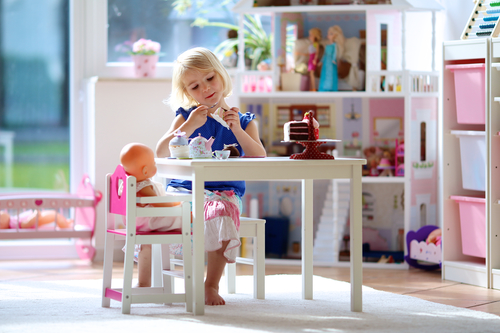
As much as play is the work of a child, pretend play is helping them learn how the world works. Through play, children imitate adults and make sense of everything that’s going on around them. Kids don’t need anything special to play pretend, but they need time to be creative. Here we’ll talk about how pretend play promotes your child’s development and what you can do to encourage more of it.
Benefits of Pretend Play
It’s easy for adults to understand why babies and toddlers need to play – mainly because they’re too little to do learning in a school setting but also because they have limited capabilities. However, as you watch your children grow up, you’ll realize that they’re always learning even when they’re not in a typical educational setting.
Kids learn by observing an ant walk across the driveway, watching a plane fly overhead, and listening to the conversation you’re having with the mailman. Kids use these bits of information they gather from all around them by recreating their own world through imaginative play. A young child often understands the concept of pretend play before they can communicate the words. For example, they may give you pretend food or dress up to look like a princess or a pirate while they’re toddlers.
Gross & Fine Motor Skills
Children acquire gross and fine motor skills in order. Most kids will learn how to walk before they can tie their shoes, because the latter requires fine motor skills while walking is a gross motor skill. Pretend play can help them advance with both. For example, they’ll learn to close buttons and zippers by putting on costumes, and they’ll learn to balance by walking the plank in their pirate games. Gross and fine motor skills are also necessary for moving figurines around, building castles and pirate ships, or drawing a treasure map.
Cooperation
Pretend games require cooperation when more than one person is involved. It’s more fun to play pirates when you have shipmates and a few enemies, too. However, in this situation, it will be necessary to establish the rules and boundaries of the game. To adults, it may look like the kids are wasting play time by setting up the world in such detail, but they’re actually learning very important skills in the process – communicating, leading, cooperating, and finding compromises. The ability to work within a group of others will be even more important in their later school and work life.
Problem Solving
Once the group has established that they’re playing pirates, they’ll have to solve numerous problems. For example, are you really a pirate without an eye patch? And if you aren’t, how can you get one real quick? They’ll have to figure out where the plank is and how they can talk their parents into extending playtime just a little bit more. The more problems kids can solve on their own, the better they get at problem solving later in life, too.
Language Development
One of the biggest factors of school success relies on proper language development. Pretend play encourages children to use and expand their vocabulary. Since they’re pretending to be someone else, they may even have an accent or use words they wouldn’t normally use. This can be challenging and fun at the same time.
Ho w to Encourage Pretend Play
Pretend play requires children to engage their imagination. While there’s not an on-switch for creativity, you can encourage your child to play pretend games quite easily by giving them more free time to play and encouraging group play.
Many children are too busy to engage in pretend play, because they already have a busy schedule. There’s nothing wrong with signing up for sports and other activities after school, as long as your child still has breathing room to be bored. If you never hear that your child is bored, then they probably don’t have enough free time to get creative. While parents don’t like to hear that their kids don’t know what to do, boredom is often the first step to having some great ideas that involve the best imaginary fun.
Kids can get used to routines as much as adults can. Fortunately, getting together with other kids of various ages can spark new ideas. Your child will be enthused about toys they haven’t played with in a long time if someone else comes over and is excited about them. Similarly, kids can create some magical words together as a group that’s not quite the same when you have to play alone.
